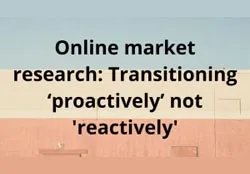
In a COVID-19 world, the insights industry needs to move to digital online research, but this should not be turned to as a panicked reaction to a crisis, says Bev Tigar, lead consultant Africa at Borderless Access.
Digital online research should be embraced as the future of the industry, regardless of the current situation. Partnering with experienced providers will smooth the transition from traditional research, in a proactive rather than reactive manner.
In times of crisis, there are two paths to take: reactive or proactive. It is entirely understandable (and much more common) for businesses and individuals to take the reactive path.
Reactive business responses to the COVID-19 crisis involve everything from protecting employees’ safety, creating temporary company protocols and ways of remote working and finding short-term solutions to continue operations during the lockdown.
These are necessary and warranted for the short term, during the period of intense crisis. But, unprecedented as the current crisis may be, history tells us that no crisis remains a crisis forever.
The world finds new ways of moving forward and the companies that thrive after upheaval are those that respond proactively to crises.
What is a proactive response to the COVID-19 situation?
Due to the timing of the pandemic’s arrival in South Africa, we are able to look at other countries that are further ahead of us on this path.
China is busy establishing its new normal, as people return to their old routines with new learnings. Chinese businesses that are already showing signs of leadership are those that have taken a longer-term view of this black swan event by implementing change processes based on the post-crisis future, rather than only the in-crisis reality.
India too, although fairly early in its stage of the pandemic, is demonstrating agility in proactively transitioning business in many sectors to digital operations.
These businesses are learning from the disruption, embracing necessary change and creatively innovating new ways of being in a post-COVID-19 world.
Of course, the post-crisis future is uncertain, but certain elements thereof hold a high likelihood of the following:
This all speaks to the fact the market research as an industry remains critical to business growth — even more so than before — as the pandemic continues to shift the global landscape of consumer behaviour at an extraordinary pace.
Here we need to again consider reactive versus proactive behaviour: It has become clear in the past decade that digital online research is the industry’s future.
It offers the potential to go deeper, provide richer insights and enable data continuity without the constraint of external or logistical limitations.
However, online methodologies should not be turned to as a knee-jerk reaction in a topsy-turvy world. The move towards online should be a careful transition, leveraging on established expertise to smoothen the process and ensure high-quality data and insights, as end-users move more and more of their methodologies online.
At Borderless Access, there has been a practice of digital online research for many years now. It has invested time and expertise in understanding how digital online methods differ from traditional and have identified how to configure digital methodologies in a way that brings the best of both worlds together.
It has done this by building research solutions, platforms and first-party hyper-niche panels enabled by the latest technology and consumer-analytics.
Case studies of its previous work highlight that digital research has the potential to revolutionise research in Africa, irrespective of the current pandemic.
The company has experimented and brought into practice artificial intelligence and machine learning for adaptive questionnaires, sampling, engagement and fraud protection, all of which enable us to continually evolve our research as it happens.
With agility and adaptability being key words for our global future, market research needs to be at the forefront of this evolution.
In the new world, businesses will need to continue to track necessary information in whatever way works most effectively and efficiently.
Digital online research is the way to do this; it was before the pandemic, it is crucial at this pivotal moment in history and it will certainly be the future of the market research and other industries alike.
© 2025 Borderless Access Pvt Ltd. All Rights Reserved.